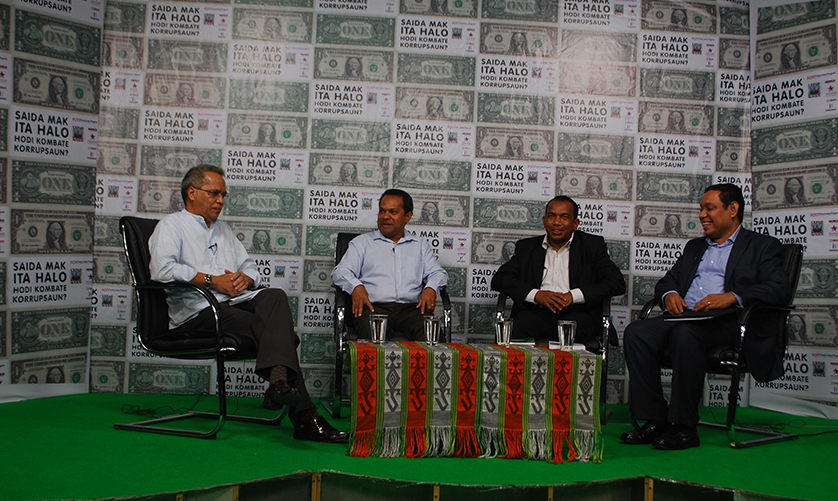Timor-Leste: What can we do to combat corruption?

Interpeace local partner, the Centre of Studies for Peace and Development (CEPAD) together with FOTI Timor-Leste Programme, hosted a debate to examine the topic of 'What Can We Do To Combat Corruption?', which aired on national television and radio on Wednesday, 4 September.
Corruption - alongside collusion and nepotism - has been identfied by over 900 Timorese as one of the main obstacles to lasting peace in the country. The fact that Timor-Leste ranks 113th out of 174 countries in Transparency International's Corruption Perception Index also demonstrates that it is one of the most pressing issues the country faces.
João Boavida, Executive Director of CEPAD, moderated the debate with a panel featuring three experts: Adérito de Jesus, Commissioner of the Anti-Corruption Commission, Adérito Hugo da Costa, Vice-President of the National Parliament and Secretary of GOPAC Timor-Leste Chapter, and José da Costa Ximenes, General Prosecutor of Timor-Leste.
Including the voices of the people
The debate was a lively exchange of ideas and opinions interspersed with the voices of citizens taken from the streets of Dili, the capital of Timor-Leste. People were asked to share their ideas about corruption and their opinions on ways to address the issue. Panellists were asked to comment on these responses, drawing on their own knowledge as key actors on the national stage. They were also asked to share their ideas about identifying corruption, addressing it through legal instruments and the judicial system and suggesting actions citizens can take at the local level to combat it themselves.
José da Costa Ximenes commented: "I want to say that corruption is an organized crime, therefore, the best mechanism to address this is for all responsible institutions and entities at the national level also to organize themselves to fight corruption together." While Adérito de Jesus added: "Combating corruption requires a social movement I think, which CEPAD can play a large role in...we must have coordination between anti-corruption agencies and civil society."
Innovative means to increase awareness
The debate was promoted extensively in order to maximize participation and awareness of the issues in all parts of the country. One of the innovative ways this was done was through a text message that was widely distributed to mobile phones across the country. An advertisement was also aired on national television over the week leading up to the debate and an email address was created to receive comments and questions both before and after debate was aired. João Boavida emphasised the importance of raising awareness of the issue of corruption across a wide section of the population: "One of the best ways to combat corruption is to increase public knowledge. When the public don't have awareness of corruption; what corruption is and its impacts on our national development, they cannot participate in the campaign to combat corruption. Efforts to strengthen public awareness of corruption and its effects is very important."
The initiative, which was viewed and listened to throughout the country, is an important step towards increasing citizen awareness on the causes, consequences and avenues to combat corruption in Timor-Leste. Citizen awareness and everyday actions are the key to fighting corruption and creating a transparent and peaceful society.
Speaking on the importance of the event and the potential impact it could have, Adérito Hugo da Costa noted: "We must have a national movement with strong will to take preventative action, such as being involved in this very serious debate. This will requires more than words, but a deep commitment to do good to serve our nation. Otherwise, our statements on the stage, on television, on the radio create a system without action. The system may be established but without political will, we cannot resolve problems, therefore, the solution lies in genuine political will to strengthen the system that we have".
